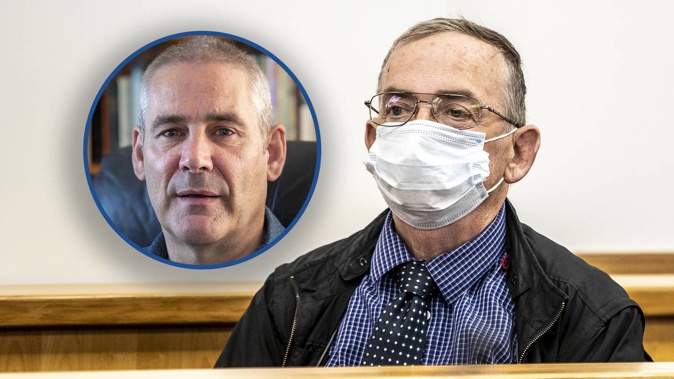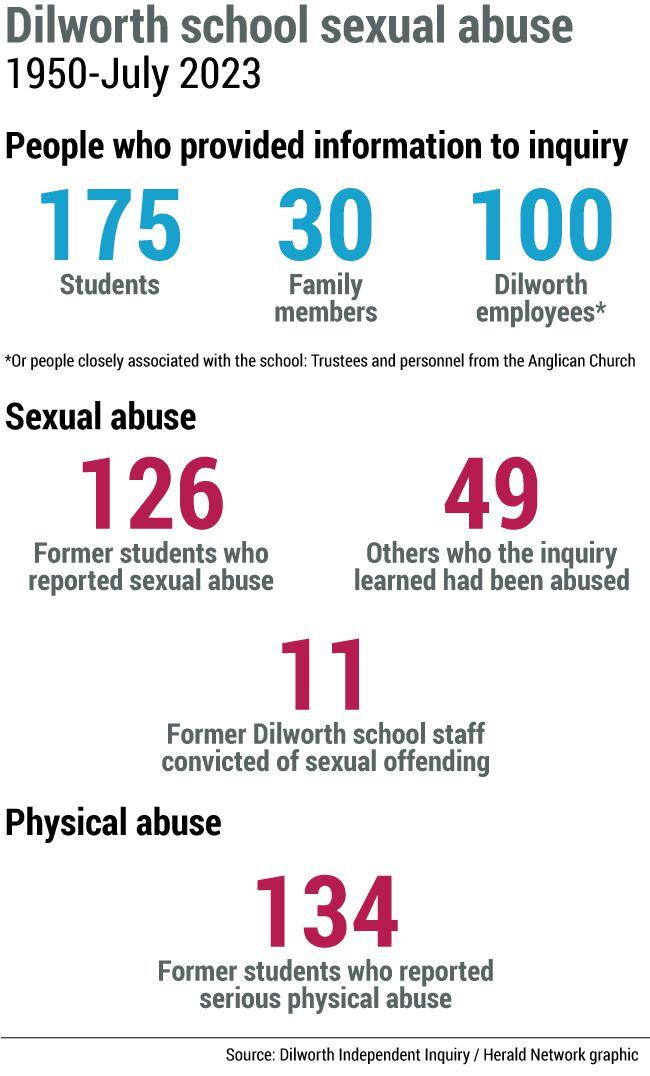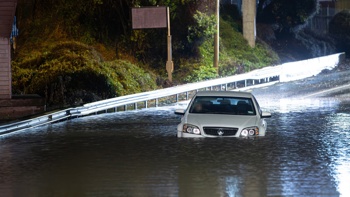

An independent review into historical sexual offending at Dilworth School has confirmed what survivors already know - that successive boards have failed over many years to prevent serious physical and sexual abuse of its students.
A 503-page report released today found the board knew about abuse dating back as far as the 1950s but didn’t investigate complaints properly, didn’t report most of it to the police and allowed known abusers to quietly leave the school with their careers intact - sometimes with a glowing reference.
The report found numerous reasons why that abuse occurred and for so long.
“The presence of staff who sexually abused Dilworth students, students’ vulnerability, parental disempowerment, the harsh, violent school environment and culture and failings in school leadership and board governance, created the ideal conditions for abuse to occur and continue.”
The report also found the ongoing silence about the sexual abuse was the primary reason for the damage caused to many former students.
“A cloak of silence was placed over the abuse, preventing the public from knowing of it, and forestalling criticism of the school. Until this century, the board perpetuated the silence by failing to notify the Department of Education or future employers of the sexually abusing staff.
“Many staff named by former students as having sexually abused them, appear to have acted alone and were probably unaware that other staff were also grooming and abusing boys. However, it is clear that several of the staff in the (Peter) Parr era and into the (Murray) Wilton era knew other staff were abusing students as well.”
The Dilworth Class Action group, which represents more than 150 sexual abuse survivors, welcomed the report, describing it as “very thorough and honest”.
Survivor Neil Harding, who has led the group, said the report not only detailed the extent of the abuse but the fact the board knew.
- 150 men have come forward about historic sexual abuse at Dilworth
- Dilworth sexual abuser granted sentence discount after appeal
- Former music teacher at Dilworth School found guilty of sexually abusing students
- Dilworth School: Another arrest after historical sexual offending investigation
- Six arrests after investigation into historical sexual offending at Dilworth School
“Instead of stopping it from happening, they took steps to cover it up - allowing it to continue from the 1950s through to 2006.”
“The report speaks for itself, and we extend our heartfelt appreciation to all survivors, their families, and others who have bravely come forward to share their experiences, ensuring that the truth of what was allowed to occur at Dilworth is now fully exposed.”
The independent inquiry, led by Dame Silvia Cartwright ONZ and Frances Joychild KC, came after historical offending was exposed at the private Auckland boarding school in 2020.
“Regrettably the report we’re releasing today is a catalogue of damage and injustice and we want to acknowledge those who suffered abuse at Dilworth,” said Cartwright.
“We have learned of the lasting effects of abuse on survivors, and of systemic failures and inaction by the school that enabled abuse to occur.
“While we understand that our report will be distressing for the Dilworth community at large, we also hope it provides some help to the surviving men and their families, many of whom are still rebuilding their lives.”
The report details 19 recommendations for the school, all of which Harding said the group urged the board to now “fully embrace”.
However, he said the board needed to especially take note of the finding that it lacks the expertise and experience required to govern a school of boys and needs to collaborate with the survivors to identify the steps needed to supplement the current redress programme and work to improve its relationship with all former students.
“This requires the Dilworth Trust Board to do more than pay lip service to the survivors, it means meaningfully engaging and working with them, their families and whānau, to ensure the redress programme is best-practice and survivor-focused.”
The group called for the board to make a “sincere and public apology” on behalf of all members since the 1950s for the “significant failures and the immeasurable harm each and every boy suffered because of their actions.
“This inquiry is about accountability.
“We sincerely hope this public report goes some way to helping the survivors know that their voices are no longer silenced by those who govern Dilworth.”
More than 170 former students gave evidence during the inquiry, 126 of whom were sexually abused. Names were also given about a further 49 boys who were also abused during their time at the school.
“Sadly, we believe the number of former students who were sexually abused is likely to be higher and we note the New Zealand Police estimates 233 student victims,” said Joychild.
“We have found that sexual abuse was committed consistently at Dilworth from the mid-1950s until the end of 2005. It peaked between the 1970s and 1990s.”

Some of the key recommendations include:
- Establish a continuous external review and oversight of school performance: It found the hidden abuse was unlikely to have happened had there been full ERO oversight.
- The board consults widely and collaborates with abused students and families, including those who have passed away or were suspected of being abused, to identify what steps are needed to supplement the redress programme in order to move forward.
- The board has an obligation to the students and their parents and whānau who have lost so much as a result of historical failures in the school’s governance. The school has taken many steps but will continue to be “blighted by the scandal that has engulfed it unless and until it works collaboratively with those abused”.
- The board need to improve its relationship with all former students, saying major rifts exist among those who came forward and those were were “fiercely protective of the school’s reputation”.
- The school needs to maintain sufficient high-quality boarding house staff.
- “Housemasters and tutors who abused could do so with impunity, due to lack of control and oversight.”
- Cooperative relationships need to be developed with police.
- The school needs to retain and archive staff disciplinary files relating to sexual abuse and serious physical abuse indefinitely.
- It also needs to develop an effective working relationship with the Anglican Church. While not Anglican the school has strong ties to the church and several parents told the inquiry they were reassured about sending their sons to Dilworth given its association.
- Other recommendations include reforming the Trust Board, undertaking reviews of child protection and complaints policies, updating its whistleblower policy, reviewing and enhancing pastoral care, continuing to improve the relationship with parents and ensuring parents, whānau and senior student representation on the school’s safeguarding committee.
“Tragically, over a 30-year period two Anglican chaplains and a temporary chaplain betrayed the trust and faith the school and the church encouraged students to have in them by sexually abusing scores of students between them. The church and the school are both responsible for this outcome.
“Between the church’s licensing of the chaplains and the school’s employment of the chaplains there were major accountability gaps. Each party relied on the other to hold the chaplains to account but neither was forthcoming with adequate relevant information in its possession to enable the other to do the job properly.”
/cloudfront-ap-southeast-2.images.arcpublishing.com/nzme/GFWNPWRQDGWOYV75SFCBBHQC4I.jpg)
Dame Silvia Cartwright co-led the inquiry. Photo / NZME
The Co-Inquirers found the Dilworth community today is very different from that of previous eras and the school has undertaken a great deal of work already to put solid policies and practices in place, including obtaining an international child safety accreditation.
“Being forced to confront its history of extensive abuse has meant many positive but essential changes have been made since 2018,” they said in the report.
The report says the inquiry was not aware of any sexual of serious physical abuse by a staff member since 2018 and there has been a major and concerted effort by the board, and school leadership to change the culture.
“School leadership and the board have fully supported the need for change, and the board has provided generous funding to ensure Dilworth students are protected from bullying, sexual abuse and a hostile environment to the highest standard possible. Indeed, we have little doubt that the policies will now become a model for the protection of children in residential accommodation elsewhere.
“The Inquiry is satisfied that Dilworth is now on a positive track.”
In the period under review (1950–2023), police have charged 12 former staff and one Dilworth volunteer in relation to 65 students. The first charge was laid in 1994. This number includes two former staff members and one volunteer connected with Dilworth who were charged following Operation Beverly but died before trial.
Eleven former staff have been convicted of various sexual abuse offences against 55 Dilworth students, 10 of whom pleaded guilty.
The Abuse: Who knew what was happening?
The report found some staff knew what was happening at the school.
Ian Wilson, who is behind bars now but gave evidence during the inquiry, said he knew both he and housemaster Rex McIntosh were sexually attracted to boys.
“Mr Wilson said it was Mr McIntosh who introduced him to the idea that it was acceptable to have sex with boys, ‘if the boys came back for it a second time’. This is consistent with what he said at sentencing, namely that he was introduced to sexual offending while employed at Dilworth.”
Wilson said he was also aware MacMurray House tutor Keith Dixon, who came to the school two years later, was sexually attracted to boys and caught him in a compromising situation with a student.
Many of the men accused of sexual abuse, including some who went on to be charged during Operation Beverly, socialised together.
“Mr Ken Wilson, Mr Ian Wilson, Mr McIntosh, another Dilworth tutor, and Mr Galloway, all of whom sexually abused Dilworth boys, partied together at Galloway’s flat and at the homes of other adult men.”
The report found there was collusion among abusers and two “shared one boy.
“A message would be sent to the boy in the boarding house after hours or on the weekend to go to the teacher in an identified office. The teacher abused the boy and then sent him to his friend (also a teacher) at another office who then sexually abused him.”
One former student described being sent at night by McIntosh from MacMurray House to Ian Wilson’s home. Wilson then tested the boy’s willingness to engage in sexual behaviour with him.
“Mr Wilson confirmed this incident, saying that prior to it, Mr McIntosh had asked him if he had ‘got your own boy yet?’. When he said no, Mr McIntosh said he would sort it out for him. Mr McIntosh also sent a boy late at night to Mr Peter Taylor’s home where he was abused.”
Why wasn’t anything done?
The report details how staff responses to complaints about abuse were often met with the boy being told they were lying and they were threatening the man’s reputation and livelihood.
“Sometimes the recipient of the complaint took advantage of this knowledge to attempt to abuse the boy himself.”
It also found one contributing factor in the abuse being undetected for so long was the naivety of school leaders who held on to unexamined myths about the incidence and nature of sexual abuse in the community.
The report used an example of one headmaster’s reason for not suspecting members of his senior team were in fact abusers was because they were “married men with children”.
Another myth was that ‘men of God’ could not be sexual abusers. Two of Dilworth’s chaplains were prolific abusers for nearly 30 years.
School failures
The inquiry found many combined failures of school leadership and governance contributed to the abuse.
“The failure to report Mr Taylor to police in 1978, after he had personally acknowledged there were other boys he had abused, had drastic consequences for boys at Dilworth. It sent a plain message to the staff who were abusing boys at that time that there would be no repercussions apart from, possibly, having to leave the school.
“Mr Wilson told us that as a staff member, this is what he understood from the way Mr Taylor was dismissed. Rather than create a deterrent, the school actively enabled sexual abusers by failing to report known abusers to police. This message was reinforced by the failure to report Mr McIntosh, My Wynyard and Mr Cave to police.”
Another failure at a governance level included not reporting teachers to the Department of Education and professional regulatory entities.
“Dilworth’s failure to notify the relevant teaching authority, particularly when combined with providing glowing references for teachers known to have abused students, is another factor likely to have emboldened abusers before 2000.
“The clear message was that they need not be concerned about any restrictions on their teaching careers after Dilworth.”

Take your Radio, Podcasts and Music with you









